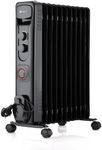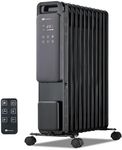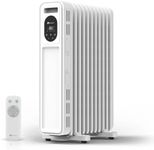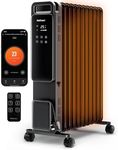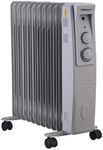Buying Guide for the Best Oil Heaters
When choosing an oil heater, it's important to consider the size of the space you want to heat, your energy efficiency preferences, and any additional features that might enhance your comfort and convenience. Oil heaters are a great option for providing consistent and gentle heat, making them ideal for bedrooms, living rooms, or any space where you spend a lot of time. They are generally quiet and maintain warmth even after being turned off, thanks to the oil inside retaining heat. Understanding the key specifications will help you select the best oil heater for your needs.Heating Power (Wattage)Heating power, measured in watts, indicates how much heat the oil heater can produce. This is crucial because it determines the size of the room the heater can effectively warm. Typically, heaters range from 500 to 2500 watts. For small rooms or spaces, a heater with lower wattage (500-1000 watts) is sufficient. Medium-sized rooms may require 1000-1500 watts, while larger spaces might need 1500-2500 watts. To choose the right wattage, consider the size of the room and how quickly you want it to heat up.
Thermostat ControlA thermostat control allows you to set and maintain a desired temperature, which is important for energy efficiency and comfort. Some heaters have adjustable thermostats with multiple settings, while others offer digital controls for precise temperature management. If you want to maintain a consistent temperature without manually adjusting the heater, look for models with a programmable thermostat. This feature is particularly useful if you plan to use the heater in a space where you spend a lot of time, as it can help maintain a comfortable environment.
Safety FeaturesSafety features are essential in any heating device to prevent accidents and ensure safe operation. Common safety features in oil heaters include overheat protection, which automatically shuts off the heater if it gets too hot, and tip-over protection, which turns off the heater if it is knocked over. Some models also have cool-touch exteriors to prevent burns. When selecting an oil heater, prioritize models with these safety features, especially if you have children or pets, or if the heater will be used in high-traffic areas.
PortabilityPortability refers to how easy it is to move the heater from one location to another. This is important if you plan to use the heater in different rooms or need to store it when not in use. Features that enhance portability include wheels, handles, and a lightweight design. If you need a heater that can be easily relocated, look for models with these features. Consider the weight and size of the heater in relation to your ability to move it comfortably.
Noise LevelNoise level is an important consideration if you plan to use the heater in a bedroom or a quiet space. Oil heaters are generally quieter than other types of heaters because they don't have fans. However, some models may produce slight clicking or popping sounds as the oil heats up. If noise is a concern, look for user reviews or product descriptions that mention quiet operation. Choosing a model with minimal noise can enhance your comfort, especially in environments where silence is preferred.
